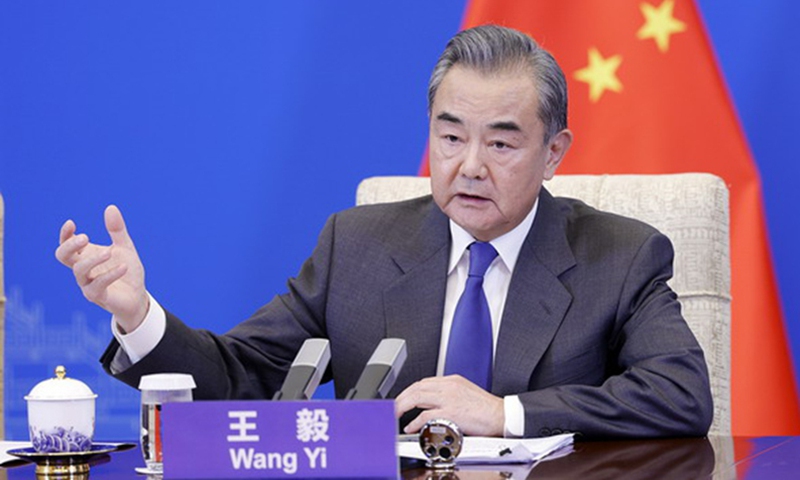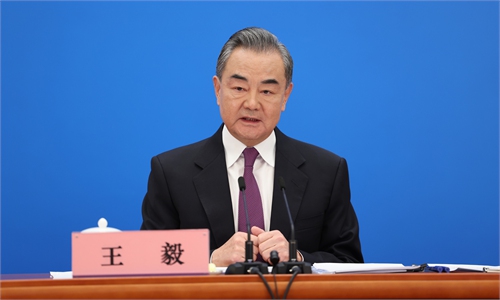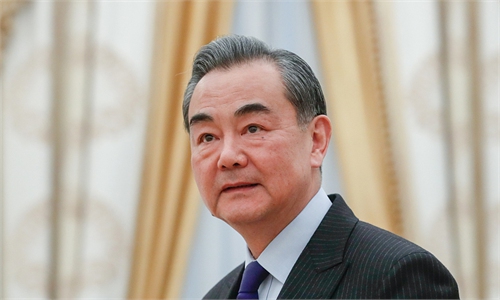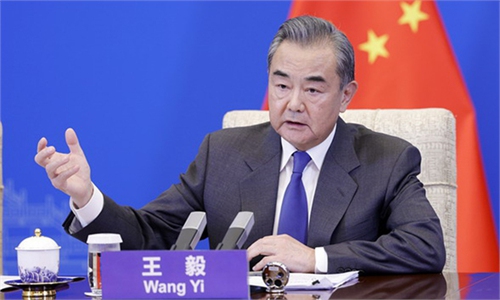
Chinese State Councilor and Foreign Minister Wang Yi Photo: Ministry of Foreign Affairs
Asia refuses to become a chessboard in the game between major powers, and Asian countries are by no means pawns in the confrontation between major powers, Chinese State Councilor and Foreign Minister Wang Yi said on Monday, noting that people should uphold the hard-won peace, stability and development of the region.
Wang made the remarks after attending the 48th session of the Council of Foreign Ministers of the Organization of Islamic Cooperation (OIC) and finishing his visits to Pakistan, Afghanistan, India and Nepal.
His visit to South Asia came at a time when the spillover effects of the Ukraine crisis are spreading and world peace and development are facing new challenges.
We are keenly aware of the strong desire of South Asian countries to uphold peace in the region and accelerate economic recovery after COVID-19. They hope to strengthen strategic communication and deepen mutually beneficial cooperation with China, according to Wang.
The visits have consolidated the traditional friendship between China and South Asian countries, he said, noting that no matter how the international situation changes, China values its relations with its neighbors, including those in South Asia.
It was the first time for the Chinese foreign minister to attend the Council of Foreign Ministers of the OIC upon invitation.
According to Wang, China and the Islamic countries reached important on a wide range of issues. They agreed to deepen strategic communication and coordination, jointly resist discrimination among civilizations, and jointly oppose theories of civilization superiority and clash of civilizations. Both parties also agreed to continue to work together to fight the pandemic, promote high-quality Belt and Road Initiative cooperation, and strengthen communication and coordination on the implementation of global development initiatives to inject impetus into the implementation of the UN 2030 Agenda for Sustainable Development.
In addition, they agreed that it is imperative to promote a just settlement of regional hotspot issues, and that the Palestine issue should not be forgotten, marginalized or allowed to continue on the path of historical injustice. They will also work to lead and drive the unity of developing countries, advocate multilateralism, abandon the Cold War mentality, resist confrontation between camps and safeguard the common interests of developing countries.
Wang also said China will unswervingly adhere to its friendly policies toward Pakistan while Pakistan reaffirmed that the Pakistan-China friendship is the cornerstone of its ddiplomac.
The two sides agreed to consolidate the transport and energy infrastructure projects under the China-Pakistan Economic Corridor (CCPEC.
Wang said that the purpose of his visit to Afghanistan was to continue the traditional friendship between the two peoples, observe the establishment and governance of the Afghan interim government, and have in-person exchanges with the Afghan side to enhance mutual understanding and trust.
This visit was aimed at sending a clear signal that the Afghan issue remains high on the current international peace and security agenda, especially for Afghanistan's neighboring countries, Wang stressed.
"As our Afghan friends often say, China is the only major country that has never harmed Afghanistan. We are ready to develop normal and friendly relations with Afghanistan as neighbors on the basis of the Five Principles of Peaceful Coexistence," Wang noted.
China stresses that security is the basis and prerequisite for development and hopes that Afghanistan will honor its commitment and take more effective measures to combat all terrorist forces, including the ETIM, Wang said.
Wang said that China and India are partners rather than rivals. This is China's strategic judgment, and India has agreed with this view.
We firmly believe that as mature and rational neighbors, we should place the boundary issue in its proper place in our bilateral relations and refrain from hindering the overall development of bilateral relations for the boundary issue, Wang said.
Both sides believe that China and India share similar positions on major international and regional issues and should strive to understand and support each other to provide more positive energy to the volatile world, he noted.
During Wang's visit to Nepal, the two countries agreed that mutual understanding and support is a tradition of friendship between China and Nepal.
We agreed to speed up Belt and Road Initiative cooperation, advance key joint projects, ensure smooth overland ports, explore cross-border cooperation, and gradually build a multi-dimensional trans-Himalayan connectivity network so that the Himalayas will become a bond of friendship and cooperation between the two countries, Wang said.
We reaffirmed that both sides will uphold the principle of non-interference in internal affairs and basic norms governing international relations, reject unilateralism and oppose power politics, according to Wang.
His visit came as the crisis in Ukraine continues to have ripple effects word wide. Developing countries in South Asia and beyond are closely following the developments and their general consensus included: to settle disputes peacefully through dialogue; war and sanctions are not good solutions; to uphold the purposes and principles of the UN Charter and safeguard the sovereignty, independence and territorial integrity of all countries; regional security cannot be guaranteed by strengthening military blocs; and to protect the right of all countries to pursue independent foreign policies and oppose political pressure and forced choice of sides.



